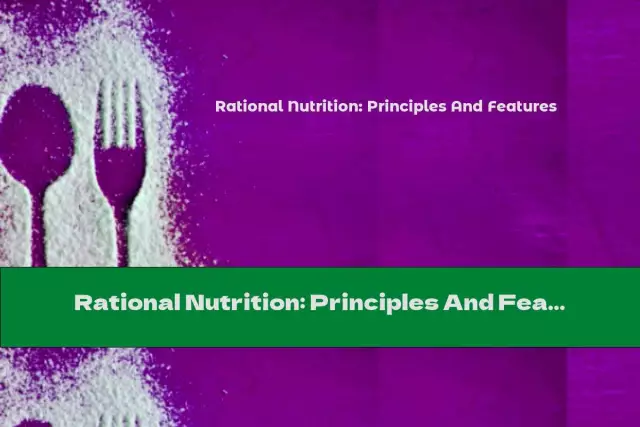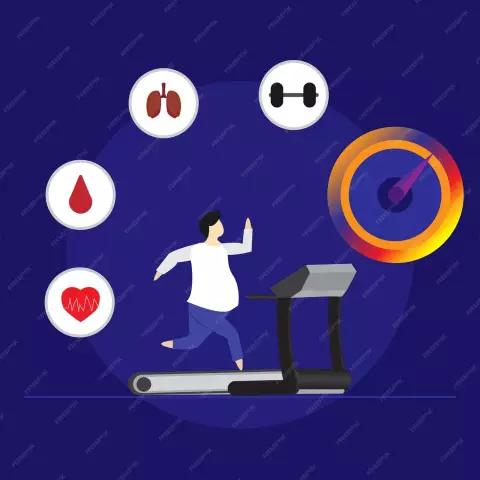- Author Rachel Wainwright wainwright@abchealthonline.com.
- Public 2023-12-15 07:39.
- Last modified 2025-11-02 20:14.
Proper nutrition for muscles

Proper nutrition for muscles is just as important as the training process itself. A proper nutritional plan includes not only the essential foods, but also the ratio of the amount of protein and carbohydrates that you need to eat to provide your muscles with everything they need for development and growth.
The Role of Proper Nutrition for Muscle Growth
Since during hard workouts the body's energy resources are depleted, and muscle tissue is partially destroyed, the diet should be rich and balanced. The role of proper nutrition for muscles can be determined as follows:
- For each next workout, complete recovery of the body is necessary, which is facilitated primarily by glycogen and protein, which is necessary to restore the integrity of muscle tissue;
- Protein accumulation and muscle building do not happen overnight. This usually takes some time;
- The energy losses that occur during intensive training can only be replenished with the help of a balanced diet with the use of complex carbohydrates, proteins and fats;
- In order for muscle fibers to adapt to an increasing load, an increased amount of protein is needed;
- For the full functioning of all metabolic processes, the body needs enzymes, which requires vitamins and trace elements.
What you should eat for muscle growth
There are three main important components of proper nutrition for muscle growth:
- Carbohydrates (energy for muscles) - rice, buckwheat, vegetables, oatmeal, fruits;
- Proteins (building materials for muscle mass) - cottage cheese, meat, eggs;
- Minerals, vitamins - vegetables, fruits, berries, herbs.
Since protein is an important component of proper muscle nutrition, special attention is paid to its quantity. According to many sports doctors, for muscle growth, it is necessary to consume 1.5-2.2 g of protein per kilogram of body.
At the same time, during such a protein-rich diet, care should be taken, since excess protein can cause the development of many diseases. First of all, kidneys and liver can be affected, and gout can also develop.
Therefore, special nutrition has been developed for athletes - the so-called protein shakes, which facilitate the intake of proteins. It is generally recommended that you get half of your workout proteins from food and half from shakes.
The principles of proper nutrition during exercise
For a full workout, the body needs a lot of energy, which means that 1-2 hours before it you need to eat a sufficient amount of carbohydrates. At the same time, it is better to eat fruits and light cereals an hour before the start of the workout, and a full meal should be eaten earlier. This is especially true for training at a high pace or heavy exercise.
For proper nutrition during training, it is necessary to take into account that immediately after them, 15-20 minutes after the pulse and blood circulation are restored, it is necessary to eat carbohydrates again to restore the energy level. It can be either fruit or porridge.
Your next meal should be rich in protein, which is essential for muscle recovery and growth.
In cases where the workout takes place in the evening and there is no time for two meals, proteins and carbohydrates can be combined in sports nutrition for men, for example:
- Buckwheat or rice porridge with fish or an omelet made from egg whites, cooked in milk, plus fruits - a pear, a few plums or an apple.
- Oatmeal with a few bananas and low-fat cottage cheese (about 200 g).
Sports nutrition for men on holiday days
Sports nutrition for men on rest days is as important as nutrition on intense training days. During rest, the body recovers, muscles grow and the energy supply system develops.
Thus, protein and vitamins are needed for muscle growth, and the diet itself should include three main meals and several intermediate light snacks.
The diet during exercise should include:
- Egg whites - 3-10 eggs per day, of which no more than three can be eaten with yolks;
- Meat, fish, poultry are mostly low-fat. These can be chicken breasts, squid meat, turkey, lean fish and beef;
- Dairy products - 0.5-1 liter of milk (with normal digestibility of this product). Also, the diet for proper nutrition for muscles should include other dairy products - kefir (0.3-0.5 l), cheese (50-150 g), cottage cheese (up to 400 g);
- Fruits that promote strength and muscle mass. Also, fruits contain a large amount of vitamins and minerals, which is necessary to increase endurance during intense training. Melons, pears, apples, grapefruits, peaches, plums, kiwi, cherries, bananas, oranges can be included in the diet of proper muscle nutrition. Also, fruits are a great food for healthy snacks, and are convenient to take with you for recovery from workouts;
- Sources of carbohydrates, among which most whole grains are buckwheat, rice, oatmeal, and vegetables.
Examples of daily meals for muscle growth
The following muscle nutrition examples daily can be followed unchanged and can be used as a basis for personalized personalized meals.

Breakfast:
- Oatmeal, low-fat cheese (30-50 g), tea with honey, pear;
- Buckwheat porridge, milk (1 glass), pear or apple;
- Egg white omelet with black bread, a glass of cocoa with a piece of dark chocolate, banana.
The second breakfast of proper nutrition for muscle growth:
- Nuts and dried fruits (dried apricots, raisins, prunes) with tea, apple;
- Low-fat cottage cheese with honey or jam, black or green tea;
- A sandwich with cheese, a glass of kefir.
Dinner:
- A portion of soup, buckwheat with meat, tea with honey, fruits - apple, orange, grapes;
- A portion of soup, rice with chicken, vegetable salad, dried fruit compote;
- Potatoes with fish, scrambled eggs, juice, fruit - banana.
Afternoon snack:
- Oatmeal, milk (1 glass);
- Two bananas, cocoa with milk;
- A portion of low-fat cottage cheese with jam or honey, black tea.
Dinner:
- Low-fat cottage cheese, yogurt (1 glass), banana, black tea;
- Buckwheat with fish, fruits (orange or apple), herbal tea;
- Omelet from 5 egg whites, fresh vegetable salad, berry juice.
The general principles of good muscle nutrition are:
- Consuming large amounts of water throughout the day;
- Meals should be fractional. At the same time, any snack - be it an apple or a glass of milk - is considered a separate meal;
- Reduce fried food intake, as it is unhealthy, and try to eat boiled, steamed or grilled food;
- Variety of different fruits, vegetables and berries used;
- Eating fatty foods should be kept to a minimum. However, this does not apply to the unsaturated omega-3 fats contained in fish and some oils, which are essential for the functioning of the whole body, especially the cardiovascular system.
Found a mistake in the text? Select it and press Ctrl + Enter.






